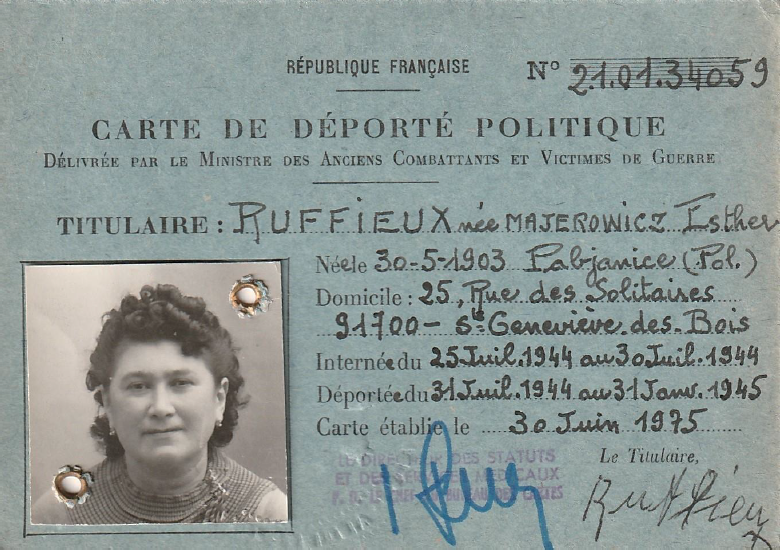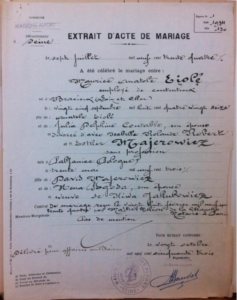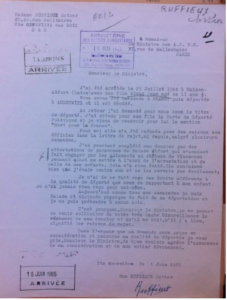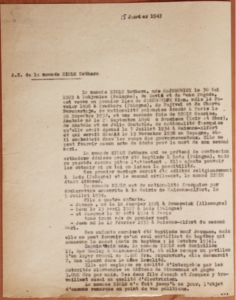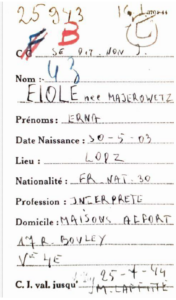Esther EIOLÉ
This biography was written by a group of 9th grade students from the Nicolas de Staël secondary school in Maisons-Alfort, in the Val-de-Marne department of France, during the 2023-2024 school year: Nejjari Nouaim; Cau-Gourdon Valentin; Ferreira Adrien; Garcette Gabrielle; Gatabazi Nuru; Leroy Morgane; Bousson Alexandre; Sandrolini Léna; Srour Raphaël; Catel-Martin Julia; Vlei Camélia; Manot Rémi; Cadoz Thomas; Ogé Aurélien; Gulia-Degomme Maxence. The students were supervised by Adrien Roso, their history and geography teacher.
We began researching the lives of two people who were deported on Convoy 77 in January 2024. This convoy, which left Drancy camp on July 31, 1944, was the last major transport of Jews to the Auschwitz-Birkenau killing center in Poland. We then put pen to paper to write the biographies of Esther Eiolé and her son, Jean Eiolé, who were living in Maisons-Alfort when they were arrested in late July 1944. Esther survived and returned home, while Jean died shortly after he was deported.
We first took the opportunity to familiarize ourselves with various types of records from a range of different sources, which gave us a better understanding of the way in which real historians work. Since we live and go to school in the town where Esther and Jean lived, we were then able to take a micro-historical approach as we researched the tragic story of two lives that were shattered by the horrors of war and anti-Semitism. As we did so, we also broadened our overall knowledge of the Nazi concentration camp system. One of the things we liked about this project was that we were carrying out a real “investigation”, finding out about Esther and Jean’s lives a little at a time, as we received the archived material. The project really brought home to us the fact that the genocide that we study in class claimed the lives of so many men, women and children who, before the war, all led normal lives, with day-to-day problems, hopes and dreams.
We would especially like to thank Françoise and Jean Jakubowiez, Esther’s grandchildren, for their help and the invaluable documents they shared with us.
We (especially our teacher) would also like to thank Claire Podetti for her outstanding assistance in searching the archives.
I) Life before the war
Given that we did not have access to any original Polish records, we know very little about Esther’s early life. We know that she was born on May 30, 1903, in Pabjanice, south of Lodz, in Poland. Her parents were Davis Majerowicz, a Bohemian crockery merchant, and Hena Pogosa. As we could only draw on sources from the French authorities, we could only piece together a small part of her story before she arrived in France. According to her grandchildren, Françoise and Jean Jakubowiez, Esther’s parents first visited France in 1900, when they went to the Paris Exposition.
Esther got married for the first time while she was still living in Lodz. Her husband, Kiva Jakubowicz, was born on February 14, 1898 in Predbora, Poland. His parents were Pajivel Jakubowicz and Charva Borensztajn.
The couple had three children, whose places and countries of birth provide clues as to the route they took on their way to France in the 1920s. Their first child, Joseph Jakubowicz (who was later known as Georges), was born on January 16, 1921 in Brunswick, Germany. Esther then had Léon on April 3, 1922 in Lodz, Poland, and their last child, Jacques, was born in Paris on August 20, 1924. This would suggest that Esther moved to France and settled in the Paris area shortly before 1924. The family set up home at 7 rue Girard, in Maisons-Alfort. Kiva worked as a second-hand goods dealer in Ivry, and the children went to the Paul Bert elementary school in Maisons-Alfort, where their teacher described them as “well-behaved” and, in Joseph’s case, an “excellent student”.
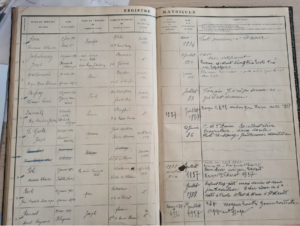
School register kept by the teachers at the Paul Bert elementary school in Maisons-Alfort
Source: Val-de-Marne departmental archives
An article in the French weekly paper Détective, published on August 20, 1931, reported that Kiva had been convicted of assaulting Esther, for which he was sentenced to a one-year suspended prison term. He died on December 28, 1932.
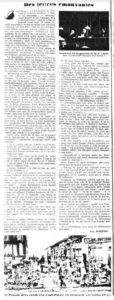
Article in the Détective, August 1931
We know that on February 12, 1933, the day that her fourth child, Jean Eiolé, was born, Esther was still living at 7 rue Girard in Maisons-Alfort. Jean was the only child she had with Maurice Anatole Eiolé, who she married in a civil ceremony on July 7, 1934. As a result of this marriage, Esther became a French citizen.
Esther and Maurice Eiolé’s marriage certificate, issued in Maisons-Alfort.
Source: File on Esther Eiolé, Victims of Contemporary Conflicts Archives Division of the Ministry of Defense Historical Service, in Caen, dossier 21P6682138201
Maurice Eiolé, who was born on September 25, 1896 in Bracieux, in the Loir-et-Cher department of France, was a litigation clerk who had previously been married to a woman called Isabelle Robert. He appears to have been a staunch Republican and/or Communist. This is borne out by the fact that he went to fight with the International Brigade in Spain against Franco’s supporters on August 29, 1936. It is unclear exactly when Maurice Eiolé died: some sources say that he died on the front line during the Battle of Jarama on November 13, 19361, while others say he died on February 7, 1937.
In 1940, Esther and her four children moved to 17, rue Bouley in Maisons-Alfort, a detached house that they rented for 2400 francs per year. As the northern half of France (which included Maisons-Alfort) was occupied by the Germans, Esther’s neighbors, Elie Bisson and Julien Philippon, suggested that she apply for a job at the Fort de Vincennes, where some Germans were stationed, thus making it less likely that they would suspect that she was Jewish. She got a job as an interpreter and canteen worker, on a salary of 3,000 francs per month. According to a letter that she sent to the Ministry of Veterans and War Victims on June 4, 1965, she felt that this would “prevent her and her children from being arrested”. Joseph and Jacques, her sons, also worked there as electricians.
Esther’s letter to the Minister of Veterans and War Victims dated June 4, 1965, Source: File on Esther Eiolé, Victims of Contemporary Conflicts Archives Division of the Ministry of Defense Historical Service, in Caen, dossier 21P6682138201
II) Arrest and deportation
A file on Esther from the Paris Police Headquarters archives suggests that the General Intelligence Service investigated her, and possibly arrested her, in January 1943. The file contains a report dated January 15, 1943, which we found very useful as it summarizes the key events in Esther’s life. According to this report, Esther described herself as “Orthodox” and stated that she had been baptized in Lodz, although she was unable to provide any documentation to prove this. It also states that she claimed to have had all of her children except Jacques baptized. However, she was only able to provide proof of baptism for Léon.
General Intelligence service report dated January 15, 1943
Source: Paris Police Headquarters archives, file ref. 77W456
The report also suggests that in January 1943, despite Esther’s attempt to conceal her Jewish roots by working at the Fort de Vincennes under the surname Eiolé, the Vichy police began to suspect that she was Jewish. It is thus reasonable to assume that when she lied about her and her children having been baptized, she did so in an attempt to save their lives. In fact, following the Vél’d’hiv roundup, which took place on July 16 and 17, 1942, during which both French and foreign Jews, including women and children, were targeted, the Jewish community had been under increasing pressure. The number of roundups and deportations increased significantly in 1942 and 1943.
In 1944, Esther moved in with her new partner and husband-to-be, François-Xavier Ruffieux, who was born on December 2, 1901 in Le Pâquier, Switzerland.
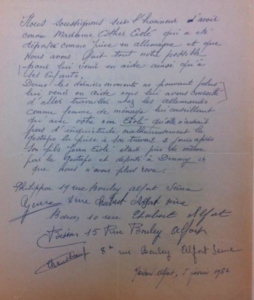
Neighbors’ sworn statement about the circumstances in which Esther and Jean were arrested. Source: File on Esther Eiolé, Victims of Contemporary Conflicts Archives Division of the Ministry of Defense Historical Service, in Caen, dossier 21P6682138201
In a letter to the Ministry of Veterans and Victims of War dated June 4, 1965, Esther stated that the Gestapo came to arrest her while she was at work at the Fort de Vincennes, and said, “they could tell that I was not on their side and was not working willingly”. The Gestapo arrested Esther’s son, Jean Eiolé, at François-Xavier Ruffieux’s home at 12, Allée des Rosiers, although. the exact date on which he was arrested is unclear. According to a neighbor, Julien Philippon, he was arrested about a week before his mother, while according to Esther’s letter, he was arrested at the same time as her on July 25, 1944. However, several other sources, such as the Drancy camp records, François-Xavier Ruffieux’s statement and a letter from another neighbor, Mrs. Zimmerman, who was there at the time, all give the date as July 27.
On July 25, Esther was interned in Drancy camp, together with Jean. They were put in room 16.1, which was in dormitory 3 on staircase 4. Esther’s Drancy record card states that when she arrived, she claimed to be “non-Jewish”. Her prisoner number was 25, 943 and the letter “B”, written in red ink, meant that she was “deportable” immediately. Curiously, her first name is listed as “Erna” rather than Esther.
Esther’s interment card, from the Drancy camp transfer register
Source: Shoah Memorial / French national archives
Both mother and son were deported to Auschwitz on Convoy 77, which left France on July 31, 1944. Jean died either on the journey to Auschwitz or in the camp itself, soon after he arrived. His official date of death was later declared to be August 5, 1944.
Esther was liberated by the Russian army on May 8, 1945. However, as she was sick, she was not repatriated to France until June 20, 1945, when she was taken to the Croix-Rousse hospital in Lyon, in the Rhône department of France.
III) Esther’s return to France and the battle to have her status officially recognized
Esther married François-Xavier Ruffieux on February 1, 1955. At the time, they were living at 25 rue des Solitaires in Sainte-Geneviève-des-Bois, in the Essonne department of France. She was working as a street trader, selling hosiery and underwear.
According to her grandchildren, Ms. Françoise Jakubowiez and Mr. Jean Jakubowiez, Esther was an open-minded, freedom-loving woman.
After she got back to France, Esther set about requesting “political deportee” status (meaning that she was deported for political reasons) for herself and her son. Jean was granted it first, together with the right to have the words “Died for France” added to his death certificate, on August 24, 1955. Despite her own application having been turned down several times, notably in 1957 on the grounds she had not provided details about the reasons for or circumstances of her arrest, she was at last officially recognized as having been a political deportee and internee on June 30, 1975. In August 1975, the French Secretary of State for Veterans Affairs and Victims of War awarded her a compensation payment of 5,130 francs.
Esther Ruffieux, née Majerowicz, died at the age of 82 on March 23, 1985, in Sainte-Geneviève-des-Bois in the Essonne department of France.
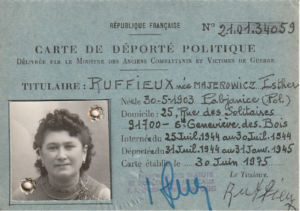
Esther’s political deportee card
Source: Jakubowiez family archives
LINKS:


 Français
Français Polski
Polski